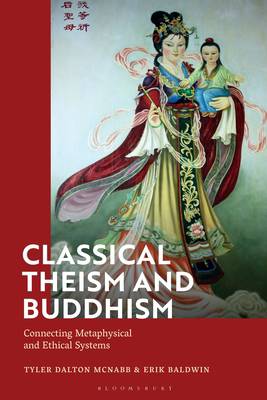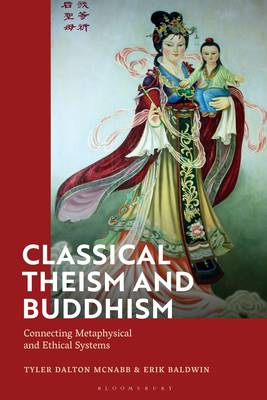
- Afhalen na 1 uur in een winkel met voorraad
- Gratis thuislevering in België vanaf € 30
- Ruim aanbod met 7 miljoen producten
- Afhalen na 1 uur in een winkel met voorraad
- Gratis thuislevering in België vanaf € 30
- Ruim aanbod met 7 miljoen producten
Zoeken
Classical Theism and Buddhism
Connecting Metaphysical and Ethical Systems
Tyler Dalton McNabb, Erik Baldwin
Hardcover | Engels
€ 220,45
+ 440 punten
Uitvoering
Omschrijving
As an atheistic religious tradition, Buddhism conventionally stands in opposition to Christianity, and any bridge between them is considered to be riddled with contradictory beliefs on God the creator, salvific power and the afterlife. But what if a Buddhist could also be a Classical Theist?
Showing how the various contradictions are not as fundamental as commonly thought, Tyler Dalton McNabb and Erik Baldwin challenge existing assumptions and argue that Classical Theism is, in fact, compatible with Buddhism. They draw parallels between the metaphysical doctrines of both traditions, synthesize their ethical and soteriological commitments and demonstrate that the Theist can interpret the Buddhist's religious experiences, specifically those of emptiness, as veridical, without denying any core doctrine of Classical Theism. By establishing that a synthesis of the two traditions is plausible, this book provides a bold, fresh perspective on the philosophy of religion and reinvigorates philosophical debates between Buddhism and Christianity.Specificaties
Betrokkenen
- Auteur(s):
- Uitgeverij:
Inhoud
- Aantal bladzijden:
- 176
- Taal:
- Engels
Eigenschappen
- Productcode (EAN):
- 9781350189133
- Verschijningsdatum:
- 10/02/2022
- Uitvoering:
- Hardcover
- Formaat:
- Genaaid
- Afmetingen:
- 140 mm x 216 mm
- Gewicht:
- 344 g

Alleen bij Standaard Boekhandel
+ 440 punten op je klantenkaart van Standaard Boekhandel
Beoordelingen
We publiceren alleen reviews die voldoen aan de voorwaarden voor reviews. Bekijk onze voorwaarden voor reviews.







